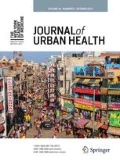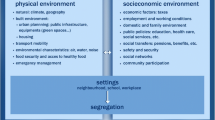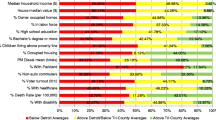Abstract
Equity in health implies that ideally everyone could attain their full health potential and that no one should be disadvantaged from achieving this potential because of their social position or other socially determined circumstances. Making cities and human settlements inclusive, safe, resilient and sustainable contributes towards ensuring healthy lives and promoting well-being for all at all ages in dignity, equality and in a healthy environment. This paper illustrates a case of applying the Urban Health Equity Assessment and Response Tool (Urban HEART) in a small town in Africa. It describes the process followed, facilitating factors and challenges faced. A descriptive single-case study design using qualitative research methods was adopted to collect data from purposively selected respondents. The study revealed that residents of the Matsapha peri-urban informal settlements faced challenges with conditions of daily living which impacted negatively on their health. There were health equity gaps. The application of the tools was facilitated by the formation of an all-inclusive team, intersectoral collaboration and incorporating strategies for improving urban health equity into existing programmes and projects. Urban HEART is a simple and easy to use valuable tool for pursuing the goal of health equity towards attaining sustainable development through evidence-based approaches for intersectoral action and community involvement.

Similar content being viewed by others
References
World Health Organization. Global Health Observatory (GHO) data: urban population growth. http://www.who.int/gho/urban_health/situation_trends/urban_population_growth_text/en/ Accessed 04 August 2017.
WHO. Kobe, Japan: World Health Organization; 2010. Hidden Cities: Unmasking and Overcoming Health Inequities in Urban Settings.
Arthurson K, Lawless A, Hammet K. Urban planning and health: revitalising the alliance. Urban Policy Res. 2016;34:4–16.
Soeung SC, Grundy J, Sokhom, H, Blanc DC, Thor, R. The social determinants of health and health service access: an in depth study in four poor communities in Phnom Penh Cambodia. Int J Equity Health 2012; 11(46).
Friel S, Loring B, Aungkasuvapala N, Baum F, Blaiklock A, Chiang TL, et al. Policy approaches to address the social and environmental determinants of health inequity in Asia-Pacific. Asia Pac J Public Health. 2012;24(6):896–914.
Corburn J. Urban place and health equity: critical issues and practices. Int J Environ Res Public Health. 2017;14:117.
World Health Organization. Urban HEART: Urban Health Equity Assessment and Response Tool (Urban HEART). Kobe, Japan: WHO Press; 2010.
World Health Organization. Urban HEART: Urban Health Equity Assessment and Response Tool User Manual. Kobe, Japan: WHO Press; 2010.
Marshall C, Rossman GB. Designing Qualitative Research. 2nd ed. Thousand Oaks, California: Sage; 1995.
Warunasinghe WAAI, Yapa PI. A survey on household solid waste management (SWM) with special reference to a peri-urban area (Kottawa) in Colombo. Procedia Food Science. 2016;6:257–60.
Mesjasz-Lech A. Municipal waste management in context of sustainable urban development. Procedia-Social and Behavioral Sciences. 2014;151:244–56.
Hayashi Y, Shigemitsu M. Proper disposal (management) of medical wastes—infection prevention and waste management (Clean Hospital Project) at Hiroshima City, Asa Hospital. Rinsho Byori. 2000 May; Suppl 112:26–31.
Nkonge Njagi A, Mayabi Oloo A, Kithinji J, Magambo Kithinji J. Knowledge, attitude and practice of health-care waste management and associated health risks in the two teaching and referral hospitals in Kenya. J Community Health. 2012 Dec;37(6):1172–7. https://doi.org/10.1007/s10900-012-9580-x.
Prasad A, Kano M, Dagg KAM, Mori H, Senkoro HH, Ardakani MA, et al. Prioritizing action on health inequities in cities: an evaluation of Urban Health Equity Assessment and Response Tool (urban HEART) in 15 cities from Asia and Africa. Soc Sci Med. 2015;145:237–42.
Morrison J, Pons-Vigués M, Bécares L, et al. Health inequalities in European cities: perceptions and beliefs among local policymakers. British Med J Open. 2014;4(5):e004454. https://doi.org/10.1136/bmjopen-2013-004454.43.
Morrison J, Pons-Vigués M, Díez E, Pasarin MI, Salas-Nicás S, Borrell C. Perceptions and beliefs of public policymakers in a southern European city. Int J Equity Health. 2015;14(1):18. https://doi.org/10.1186/s12939-015-0143-5.
Prasad AM, Chakraborty G, Yadav SS, Bhatia S. Addressing the social determinants of health through health system strengthening and inter-sectoral convergence: the case of the Indian National Rural Health Mission. Glob Health Action. 2013;6:20135.
Rice M, Hancock T. Equity, sustainability and governance in urban settings. Global Health Promotion. 2016;23(Suppliment 1):94–7.
Pridmore P, Carr-Hill R, Amuyunzu-Nyamongo M, Lang’o D, McCowan T, Charnes G. Tackling the urban health divide though enabling intersectoral action on malnutrition in Chile and Kenya. J Urban Health-Bull New York Acad Med. 2015;92(2):313–21.
Corburn J, Curl S, Arredondo G, Malagon J. Health in all urban policy: city services through the prism of health. Journal of Urban Health-Bulletin of the New York Academy of Medicine. 2014;91(4):623–36.
Storm I, den Hertog F, van Oers H, Schuit AJ. How to improve collaboration between the public health sector and other policy sectors to reduce health inequalities? A study in sixteen municipalities in the Netherlands. Int J Equity Health. 2016;15(97):97.
Friel S, Akerman M, Hancock T, et al. Addressing the social and environmental determinants of urban health equity: evidence for action and a research agenda. J Urban Health-Bull New York Acad Med. 88(5):860–74.
Sustainable Development Goals. In: United Nations sustainable development knowledge platform [website]. New York: United Nations; 2015. https://sustainabledevelopment.un.org/?Menu=1300. Accessed 14 December 2016.
The Global report on urban health: equitable, healthier cities for sustainable development. World Health Organization Website. www.who.int/kobe_centre/measuring/urban-global-report/en/. Accessed 14 December 2016.
Acknowledgements
No funding was received to conduct the study.
Author information
Authors and Affiliations
Corresponding author
Rights and permissions
About this article
Cite this article
Makadzange, K., Radebe, Z., Maseko, N. et al. Implementation of Urban Health Equity Assessment and Response Tool: a Case of Matsapha, Swaziland. J Urban Health 95, 672–681 (2018). https://doi.org/10.1007/s11524-018-0241-y
Published:
Issue Date:
DOI: https://doi.org/10.1007/s11524-018-0241-y




